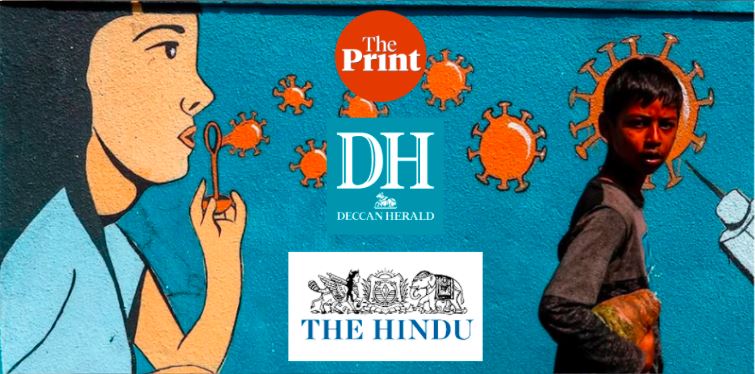Have you ever seen any mainstream media news outlet or publication, both within India and globally, call the novel Coronavirus Sars-Cov-2 a “Chinese” or “Wuhan” virus? We bet you have not. However, the names of various emerging variants are almost always being associated with the countries they originated from. The B.1.1.7 variant, first found in the United Kingdom, has come to be called the “UK variant”. The B.1.351 variant which originated in South Africa too is called the South African variant. The same is the case with the P2 variant, which was first found in Brazil.
In India, the predominant strain causing the second wave of infections is the B.1.617 variant. Despite the WHO not associating the variant with ‘India’, Indian media has gone on an overdrive to call the B.1.617 variant an “Indian variant” or more subtly, an “Indian origin variant”. Foreign publications like the BBC, Guardian, Arab News among others too are making no secret of the fact that they like calling the B.1.617 strain a variant of Indian origin.
In a report titled, “Everything you need to know about B.1.617.2, the “Indian variant” of coronavirus,” BBC’s Science Focus magazine unabashedly called the strain in question by the name “Indian variant”. Domestically, Indian media houses are more calculative in their approach. Instead of referring to the B.1.617 strain as an “Indian variant”, they have begun calling it the “Indian origin variant”. Nonetheless, their motives are amply clear. While none of these media houses had the courage to mention Coronavirus and China in the same breath when the pandemic first broke out, they are now referring to a variant with a defined scientific nomenclature as an “Indian/Indian origin variant” without fear.
The Print, The Hindu, BloombergQuint, Deccan Herald are only some of the outlets caught using either of the two terms in their reports. The Hindu, as a matter of fact, in a piece titled, “A matter of concern: On Indian coronavirus variant,” opened with a line which read, “The Indian variant, B.1.617 and its family of related coronaviruses have been categorised as a Variant of Concern (VOC) by WHO, a classification which will now prompt greater international scrutiny of those who test positive overseas.”
The Print carried a report titled, “Covaxin works against Indian-origin variant, finds ICMR-Bharat Biotech in lab tests,” while Deccan Herald published a story with the headline, “Is the Indian-origin B.1.617 Covid variant behind the second wave?” Such reports come even after the government of India officially called out media outlets for referring to the B.1.617 strain as an “Indian/Indian origin variant”.
Read more: Remember the WHO report that blamed the Indian double mutant? It was a hit-job by Indian media
In an official statement calling out the media for its unscientific approach to coverage, the government said, “Several media reports have covered the news of WHO classifying B.1.617 as variant of global concern. Some of these reports have termed the B.1.617 variant of the coronavirus as an ‘Indian Variant’. These media reports are without any basis, and unfounded.”
The statement added, “This is to clarify that WHO has not associated the term ‘Indian Variant’ with the B.1.617 variant of the coronavirus in its 32-page document. In fact, the word “Indian” has not been used in its report on the matter.”
In fact, even the World Health Organisation had taken a strong stand against media outlets calling B.1.617 an “Indian origin variant”. The health body had said, “WHO does not identify viruses or variants with names of countries they are first reported from. We refer to them by their scientific names and request all to do the same for consistency.”
WHO does not identify viruses or variants with names of countries they are first reported from. We refer to them by their scientific names and request all to do the same for consistency. @PTI_News @PIB_India @ANI @timesofindia @htTweets @IndianExpress @the_hindu @MoHFW_INDIA
— World Health Organization South-East Asia (@WHOSEARO) May 12, 2021
Media organisations that continue to refer to the B.1.617 strain as an “Indian origin variant” must be reprimanded. They must also be probed as to why they never dared to call Sars-Cov-2 a “Wuhan virus”, yet continue to go overboard in associating a variant of it with India.
